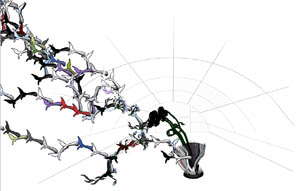Google’s new blog search engine reminds me of how far we still have to go with blog search. The engine works much the same way as Google’s general web search – with keywords and page ranking – only here it’s searching RSS feeds. Recent posts with keyword matches fill the column, and a few links to related blogs come up at the top. But there’s the rub. These so-called “related” blogs are only related by direct keyword matches in their title tagline. I just searched “poetry” and came up with only three related blogs. C’mon. A search for “gossip” turns up only one related blog – “Starbucks Gossip”. There has to be some kind of promotion going on here, though their “about” page mentions nothing of the kind.
A good engine would be capable of searching blogs by their subject, their preoccupation, their obsession. Many blogs could be considered “general,” but just as many have a special focus, and readers are often searching with a particular theme in mind. They don’t just want a list of transient posts, but whole sites that might potentially become regular destinations. Many blogs are valuable publications that prove themselves day after day. But blog search hasn’t yet grown beyond the trendy “what’s the latest chatter on the blogosphere” mode.
I do have to give credit to Technorati. Glitchy as it is, they’re trying to think of creative ways – tagging, author-determined keywords – to help readers find interesting blogs and authors their audience. Then again, my greatest finds have usually been from other blogs. Humans will always be the smartest aggregators.
People out there, what do you use?
Monthly Archives: September 2005
flash memory: “the digital paper age”?
Heads are spinning in response to Samsung’s planned release of a 16 gigabyte flash drive – a string of eight 2GB flash memory cards. Flash memory is solid state data storage, as opposed to the conventional hard drive, which contains spinning mechanical parts. The implication is that the price of memory for computers will soon drop dramatically, as will the amount of energy used to power them. Moreover, you will be able to carry millions upon millions of pages on something the size of a keychain (people will probably start using smaller ones as business cards before too long). There’s definitely something reassuring about the solidity – to rely entirely on a single, rickety hard drive, or a network, to store documents is incredibly risky and unreliable. Plus, these cards are far more tolerant of shocks, bad weather and all around abuse.
Chosun Ilbo describes the remarks of Hwang Chang-gyu, Samsung’s chief executive, who said:
…the development signaled the opening of the “digital paper age.” “In the same way that civilization rapidly progressed after paper was invented 2,000 years ago, flash memory will serve as the ‘digital paper’ to store all kind of information from documents to photos and videos in the future. Mobile storage devices like CDs and hard disks will gradually disappear over the next two or three years, and flash memory will dominate the information age.”
uh oh

![]()
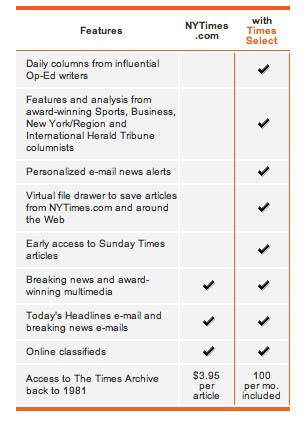
It’s really happening. Next Monday, The New York Times will inaugurate its “Times Select” subscription service. NYTimes.com will remain free, with much of the usual content still available (including multimedia), but op-eds and columnists will be pay-only. Oh well, the Washington Post opinion page is better anyway. The 100-article-per-month archive access is slightly tempting though.
The Times is betting that significant numbers of readers will shell out, just like they do for a premium channel on cable. Can the Times be the HBO of web news? Casual reader poll: who’s thinking of paying?
(link: Letter From the Editor explaining the new service to readers)
reed elsevier and the arms trade

![]() They say that sunlight is the best disinfectant. And so I’m pointing to this upsetting story about educational publishing giant Reed Elsevier’s complicity in international violence through a subsidiary (Spearhead Exhibitions) that runs one of the world’s largest arms fairs. There are the beginnings of a movement for academics and others to demand that R.E. drop this sordid business.
They say that sunlight is the best disinfectant. And so I’m pointing to this upsetting story about educational publishing giant Reed Elsevier’s complicity in international violence through a subsidiary (Spearhead Exhibitions) that runs one of the world’s largest arms fairs. There are the beginnings of a movement for academics and others to demand that R.E. drop this sordid business.
(via Crooked Timber)
yahoo! experiments with multimedia journalism
Yahoo! has enlisted tele-journalist and blogger Kevin Sites to produce a one-year web program chronicling the world’s conflict zones in multimedia format.
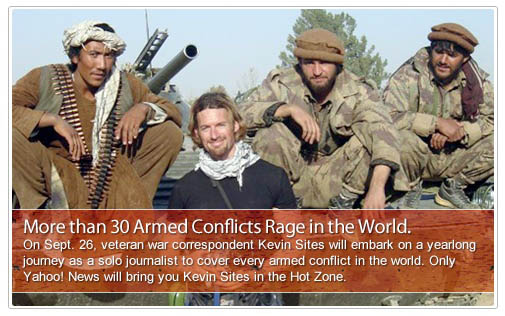
Sites has become known for his jaunts as a “solo journalist,” trundling from hot spot to hot spot with a backpack full of gadgetry, beaming reports from his one-man broadcast station. It’s a formula that is tailor-made for the web. Clearly, Yahoo! was paying attention. The NY Times reports on “Kevin Sites In the Hot Zone”:
As he travels to these places, Mr. Sites will write a 600- to 800-word dispatch each day and produce a slide show of 5 to 10 digital photographs. He will also narrate audio travelogues. There will be several forms of video – relatively unedited footage posted several times a week, and once a week, a more traditional video report, edited in the style of a network news broadcast.
Mr. Sites will also be the host of regular online chats with Yahoo users who will be able to post comments on message boards. And he will post quick text messages on the site updating his activities throughout the day.
Counting on war and carnage as a surefire crowd draw, Yahoo! makes a rather tawdry entrance into independent journalism. But this is a very significant move nonetheless, evidence that Yahoo! is evolving into a full-fledged media company, and suggesting that the one-man-band approach to journalism and webcast might become a regular thing. If the Sites show finds an audience, they should try out serious investigative reporting or medium-length documentary.
losing america
I still have my husband’s visitor pass for 2 World Trade Center. He had clients on the 34th floor, so he visited frequently. On the morning of September 11, 2001, after the first plane hit, he called to tell me he was safe in his midtown office. He stayed on the phone with me as I sat on the front porch of our Brooklyn apartment to watch, helplessly, as the Trade Center Towers burned and fell. In the weeks following, I walked around in a daze, overwhelmed by the grief I felt for people I did not even know and for the city itself, which seemed strangely animate in the wake of the disaster; like a wounded giant. That the nation rushed to our aid and poured out its heart to us made things easier, but not many outside the city understood how bad it was. (To get a sense of what things were like in New Orleans in the days following the hurricane, I recommend this incredible First Person Katrina Account published on “Democratic Underground.”)
In that context, I’ve been trying to understand the enormity of the devastation wrought by Hurricane Katrina, but I can’t even begin to. September 11 seems small by comparison. We didn’t lose our homes. Our city didn’t drown. Our citizens were not abandoned, starved, mistreated, and driven to despair. My heart goes out to these victims whose suffering is exacerbated by leaders who are failing them so profoundly and, in some cases, so willfully. Attempts to deliver food, water, and much-needed relief to stranded survivors were purposely thwarted by armed authorities including the National Guard. (see Boing Boing’s September 9th article Katrina: Authorities bar Red Cross from NOLA; Blackwater gets carte blanche). The Red Cross Disaster FAQ page also has this answer to the question: Hurricane Katrina: Why is the Red Cross not in New Orleans?
• Access to New Orleans is controlled by the National Guard and local authorities and while we are in constant contact with them, we simply cannot enter New Orleans against their orders.
• The state Homeland Security Department had requested–and continues to request–that the American Red Cross not come back into New Orleans following the hurricane. Our presence would keep people from evacuating and encourage others to come into the city.
• The Red Cross shares the nation’s anguish over the worsening situation inside the city. We will continue to work under the direction of the military, state and local authorities and to focus all our efforts on our lifesaving mission of feeding and sheltering.
• The Red Cross does not conduct search and rescue operations. We are an organization of civilian volunteers and cannot get relief aid into any location until the local authorities say it is safe and provide us with security and access.
The hero worship of 9/11 victims and relief workers, which bolstered morale and lent some humanity to the crisis, is almost entirely absent from the Hurricane Katrina “spin”. Katrina victims suffer the added humiliation of insensitive, uninformed, or blatently racist remarks made by elected officials who are trying to minimize the tragedy, shift blame to the victims, and deny responsibility. These quotes were selected from about.com’s 25 Mind-Numbingly Stupid Quotes About Hurricane Katrina And Its Aftermath
“I have not heard a report of thousands of people in the convention center who don’t have food and water.” -Homeland Security Secretary Michael Chertoff, on NPR’s “All Things Considered,” Sept. 1, 2005
“I mean, you have people who don’t heed those warnings and then put people at risk as a result of not heeding those warnings. There may be a need to look at tougher penalties on those who decide to ride it out and understand that there are consequences to not leaving.” -Sen. Rick Santorum (R-PA), Sept. 6, 2005
“I don’t make judgments about why people chose not to leave but, you know, there was a mandatory evacuation of New Orleans.” -FEMA Director Michael Brown, arguing that the victims bear some responsibility, CNN interview, Sept.
1, 2005
“Now tell me the truth boys, is this kind of fun?” -House Majority Leader Tom Delay (R-TX), to three young hurricane evacuees from New Orleans at the Astrodome in Houston
We finally cleaned up public housing in New Orleans. We couldn’t do it, but God did.” -Rep. Richard Baker (R-LA) to lobbyists, as quoted in the Wall Street Journal
“I also want to encourage anybody who was affected by Hurricane Corina to make sure their children are in school.” -First Lady Laura Bush, twice referring to a “Hurricane Corina” while speaking to children and parents in South Haven, Mississippi, Sept. 8, 2005
And this from the Louisiana Senator:
“Thank President Clinton and former President Bush for their strong statements of support and comfort today. I thank all the leaders that are coming to Louisiana, and Mississippi and Alabama to our help and rescue. We are grateful for the military assets that are being brought to bear. I want to thank Senator Frist and Senator Reid for their extraordinary efforts. Anderson, tonight, I don’t know if you’ve heard – maybe you all have announced it — but Congress is going to an unprecedented session to pass a $10 billion supplemental bill tonight to keep FEMA and the Red Cross up and operating.” -Sen. Mary Landrieu (D-LA), to CNN’s Anderson Cooper, Aug. 31, 2005, to which Cooper responded:
“I haven’t heard that, because, for the last four days, I’ve been seeing dead bodies in the streets here in Mississippi. And to listen to politicians thanking each other and complimenting each other, you know, I got to tell you, there are a lot of people here who are very upset, and very angry, and very frustrated. And when they hear politicians slap – you know, thanking one another, it just, you know, it kind of cuts them the wrong way right now, because literally there was a body on the streets of this town yesterday being eaten by rats because this woman had been laying in the street for 48 hours. And there’s not enough facilities to take her up. Do you get the anger that is out here?”
I can sympathize with the incredulity expressed by the writer of yesterday’s post on Daily Kos “The Conscious Decision to Let People Die”. I’m not naíve, I know that poor and middle class people are at the mercy of the rich and powerful and that if the rich don’t feel like helping, nobody can make them. But I was under the impression that some things are sacred, and that in America we don’t take food and water away from starving thirsty people. We don’t abandon our people to certain death, and we don’t sneer at those who are suffering. The way I understood it, American Freedom (with a capital F) had to do with the powerless having at least enough power to demand fair and humane treatment. I thought it meant that the hardworking tax-paying public could expect help in a time of dire crisis. I thought our Democracy had checks and balances to minimize corruption and incompetance. I thought America (even under the current administration) had something to do with being civilized, humane and fair.
I don’t anymore.
(The above has nothing and everything to do with the future of the book.)
thoughtful intertextuality
New Orleans DoubleQuotes by Charles Cameron plays with juxtaposition, cleverly pairing bits of text in ways that illuminate Katrina and all that flows from it:
Think of these paired quotes as twin thoughts dropped into the mind-pond — not so much for their own sakes as for the sake of the ripples and resonances between them. I invite you to read these DoubleQuotes one pair at a time, slowly, slowly, so that the multiples ironies and quiet nuances that have come together in the weaving of this tragedy have room to breathe.
(thanks, Bryan Alexander of Infocult)
craigslist new orleans – web 2.0 in action
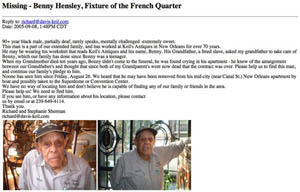

You can find just about anything on craigslist. Bikes, mattresses, futons, stereos, landscapers, moving vans, graphic designers, jobs. You can even find missing persons, or a safe haven thousands of miles from what was once your home. How a public classifieds section transformed itself overnight into a dynamic networked survival book – a central node in the effort to locate the missing and provide shelter to the uprooted – captures the significance of what has happened over the past two weeks in Katrina’s wake. The web has been pushed to its full potential, capturing both the enormity of the disaster (in a way that the professional media, working alone, would have been unable to), and the details – the individual lives, the specific intersections of streets – that got swept up in the flood. This give-and-take between global and “hyperlocal” is what Web 2.0 is all about. Danah Boyd recently described this as “glocalization” – “a dance between the individual and the collective”:
In business, glocalization usually refers to a sort of internationalization where a global product is adapted to fit the local norms of a particular region. Yet, in the social sciences, the term is often used to describe an active process where there’s an ongoing negotiation between the local and the global (not simply a directed settling point). In other words, there is a global influence that is altered by local culture and re-inserted into the global in a constant cycle. Think of it as a complex tango with information constantly flowing between the global and the local, altered at each junction.
The diverse, simultaneous efforts on the web to bear witness and bring relief to the ravaged Gulf Coast – a Knight Ridder newspaper running hyperlocal blogs out of a hurricane bunker (nola.com); a frantic text message sent from a phone in a rapidly flooding attic to relatives in Idaho who, in turn, post precise coordinates for rescue on a missing persons forum (anecdote from Craig Newmark of craigslist); an apartment rental registry turned into a disaster relief housing index; images from consumer digital cameras leading the network news; scipionus.com, the interactive map wiki where users can post specific, geographically situated information about missing persons and flood levels – that is the dance. The case of the scrappy craigslist, or rather its users, rising to the occasion is particularly moving.
recommended podcast: “information as news”
Katrina blew through the news business just as furiously as it tore through the Gulf Coast. For a good discussion of this, I highly recommend last night’s podcast of Open Source, a great new program on public radio that is of, by and through the web, generating story ideas and discussion on its blog. The show operates in an exciting border zone, dealing with general interest stories while always keeping an eye on the changing communication practices that are affecting/chanelling them. Last night’s show – “Craigslist and Nola.com: Information as News” – deals with citizen coverage of Katrina and the big changes underfoot for professional journalism.
Host Christopher Lydon speaks, with the breathless excitement of a man watching his profession change before his eyes, about “changing terms of authority in the news business” after Hurricane Katrina. He has on as guests Craig Newmark of craigslist (New Orleans site), nola.com editor Jon Donley, and media critic/blogger/citizen journalism guru Jeff Jarvis. From the intro:
The best reporting in the world — no hyperbole, the best reporting in the world — this week came from the web division of the New Orleans Times Picayune, nola.com. Information — missing person reports, safe and alive person reports — became news. And it became a source, even, for rescue teams, more accurate than anything else they had to go on.
Craigslist, after Katrina, became a forum for finding the missing and housing the saved, and what you find on Craigslist are stories as compelling as anything on CNN. Maybe what communities want in a time of crisis is good information, and maybe detailed, accurate information makes the best story. Craig and Jeff helped invent two new ways of collecting and distributing information; Jon is perfecting it right now in the Crescent City.
fertile pages

Organic HTML is a wonderful little applet I came across that turns websites into bizarre-looking plants. information aesthetics speculates on how it might work:
the emerging plant appears to use the colors similar to those found in the website HTML, CSS or images, while its size & branches depend on the site structure, content or number of pages. without any readily provided explanation or legend, one keeps trying to feed it URLs to derive the most beautiful flower (while avoiding the sometimes appearing flies)
Plug in a URL and try it out (be warned: it might crash your browser). if:book is apparently an inky species of blog (see above). I’ll add this to our garden. I wonder why there aren’t more sprouts of orange? The New York Times comes out more floral.
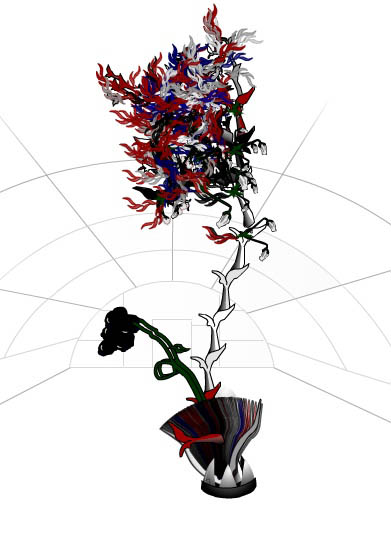
Something interesting I found, take a look at these two plants. One is Google, the other Yahoo! Can you guess which is which? (The larger plant has been scaled down.)
